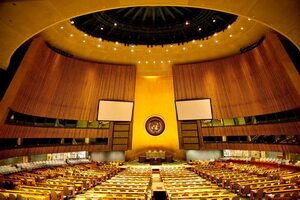
Oleksiy Volovych
September 13 in New York there began the 71st session of the UN General Assembly. Delegations from 193 countries are taking part in the UN General Assembly. There are 170 questions on the agenda of the UN General Assembly Session, the main of them are as follows: to promote sustained economic development; peace and security; protection of human rights; coordination of humanitarian assistance in crisis regions of the world; promotion of justice and international law; disarmament and curbing the arms race; problem of refugees and migrants; crime prevention; struggle against terrorism and drug trafficking and other issues.
On the first day of the Session there was an official appointment of the new Chairman of the General Assembly and leadership of the Committees, whose authority will last for the next year. The Chairman of the UN General Assembly on the 71st Session was elected the Permanent Representative of Fiji to the United Nations Peter Thomson. A high-level meeting devoted to refugees and migrants issues was held September 19. September 20 there was a general debate themed “The Sustainable Development Goals: a Universal Push to Transform Our World”.
The 71st session of the UN General Assembly is for the last time led by Secretary-General Ban Ki-moon, who is leaving office January 1, 2017. Tentatively in October 2016 the UN General Assembly must approve the candidacy of the new UN Secretary-General (which will be submitted by the UN Security Council) for the next five-year term. At the moment the UN Security Council has held 4 meetings devoted to discussing a possible candidate for the post of the UN Secretary-General out of the 10 official candidates.
18-22 September, Ukraine's official delegation headed by President P. Poroshenko participated in the work of the 71st session of the UN General Assembly. This is P. Poroshenko's fourth visit to the USA in the status of President of Ukraine. 17-18 September, 2014, P. Poroshenko made his first visit to the USA, during which he met with President B. Obama, Vice President J. Biden and Secretary of State J. Kerry, and gave a speech to the US Congress. P. Poroshenko's second visit to the United States took place in September 2015 within the framework of the 70th Jubilee Session of the UN General Assembly, on the sidelines of which he three times met with B. Obama, talked with the leaders of Britain, Germany and France. At the US President's invitation, P. Poroshenko visited the Summit on Peacekeeping and the Clinton Global Initiative. March 30–April 2, 2016, there was P. Poroshenko's third visit to the United States, during which he took part in the 4th Nuclear Security Summit, the Forum “Ukraine's Battle for Freedom Continues” and had several meetings with the leaders of the USA and other countries.
Traditionally, the President of Ukraine's stay in New York began with a meeting with representatives of the Ukrainian community at the Ukrainian Institute of America, during which he, in particular, pointed out that Ukraine is interested in providing the Ukrainian Armed Forces with lethal weapons and other military assistance. The President called on the Ukrainian community of the United States to continue supporting Ukraine in its fight against the aggressor.
During his meeting with representatives of American businesses, P. Poroshenko thanked the US-Ukrainian Business Council for its support for the development of fruitful business relations between the two countries, stressing that despite the Russian Federation's aggression, Ukraine continues strengthening its economy, defence capacity, and is fighting corruption. The President invited American businessmen to invest into the Ukrainian economy.
On the sidelines of the UN General Assembly there was also P. Poroshenko's meeting with representatives of Jewish organizations in the USA. The Head of our State spoke about the situation in the East of Ukraine and the violation of human rights in the occupied territories and expressed hope for continued support from the United States, particularly in the military-technical sphere. The President invited the representatives of the US Jewish community to participate in activities devoted to the 75th anniversary of the Babyn Yar tragedy, which are scheduled for September 29, with the participation of many foreign delegations.
The President of Ukraine's Speeches at the UN General Assembly
September 19, at the UN headquarters in New York there was a Summit for Refugees and Migrants, which approved the New York Declaration (provides for preparation by 2018 of two global agreements to regulate the problem of migration and fair distribution of responsibility in the reception of refugees).
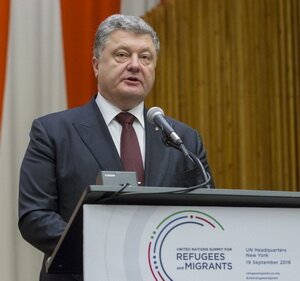 In his speech at the Summit P. Poroshenko said that foreign aggression and state-sponsored terrorism are the enemies of mankind in many parts of the world, pointing out that “the Russian military aggression forced some 1.8 million Ukrainians seek new place of residence in their own country”. President of Ukraine proposed to develop an international mechanism to protect internally displaced persons and to restore the position of the Special Representative of the UN Secretary-General for internally displaced persons. P. Poroshenko also pointed out that Ukraine is making every effort for social protection of displaced persons, including access to education, services in the field of employment and health care. “Our dedication helped, in particular, to prevent another large wave of refugees to Europe”, said the President of Ukraine.
In his speech at the Summit P. Poroshenko said that foreign aggression and state-sponsored terrorism are the enemies of mankind in many parts of the world, pointing out that “the Russian military aggression forced some 1.8 million Ukrainians seek new place of residence in their own country”. President of Ukraine proposed to develop an international mechanism to protect internally displaced persons and to restore the position of the Special Representative of the UN Secretary-General for internally displaced persons. P. Poroshenko also pointed out that Ukraine is making every effort for social protection of displaced persons, including access to education, services in the field of employment and health care. “Our dedication helped, in particular, to prevent another large wave of refugees to Europe”, said the President of Ukraine.
P. Poroshenko's Speech at the UN Security Council's Meeting on Syria
At the beginning of his speech P. Poroshenko pointed out that the conflict in Syria has become a tragedy for millions of people, a serious challenge to the international community and has already caused a lot of serious negative consequences: uncontrolled migration, growth of terrorism, expansion of the “Islamic State” and of other extremist groups. President of Ukraine expressed his belief that the Syrian government is solely responsible for the current state of the country and for the terrible suffering of the Syrian people.
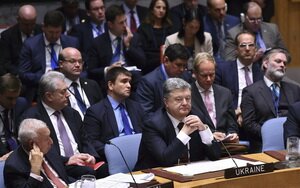 Russia's external support for the Assad's regime has played a significant role in the emergence of this catastrophic situation. P. Poroshenko stressed that it was part of Russia's deliberate policy: to unleash hostilities, to raise the stakes and then to offer its services of a mediator in settling the conflict, which is very similar to the situation in Ukraine, which, unfortunately, remains a “testing ground” for Russia's testing such approaches.
Russia's external support for the Assad's regime has played a significant role in the emergence of this catastrophic situation. P. Poroshenko stressed that it was part of Russia's deliberate policy: to unleash hostilities, to raise the stakes and then to offer its services of a mediator in settling the conflict, which is very similar to the situation in Ukraine, which, unfortunately, remains a “testing ground” for Russia's testing such approaches.
The Head of the Ukrainian State pointed out that the United Nations, in particular its main body — the Security Council, has shown its ineffectiveness in resolving the conflict in Syria, which undermines the mission of the whole Organization and challenges its very existence. According to P. Poroshenko, the United Nations' having not responded to Russia's military aggression against Ukraine and the occupation of the Crimea, allows Russia today to use the Peninsula as a military base for the military operation in Syria, where ships throw a considerable amount of Russian military forces and equipment, based in the Crimea. According to the President of Ukraine, all this proves once again that there is absolutely urgent and critical need for the Security Council's reform, especially in terms of using the right to “veto”.
Concluding his speech, P. Poroshenko pointed out that the political process in Syria should be aimed at restoration of the sovereignty and territorial integrity of the country and establishment of a transitional government with executive powers in full compliance with the Geneva Communique, and the UN Security Council's Resolution № 2254, and then a new constitution should be adopted and elections should be held.
The President of Ukraine was in the top ten speakers on September 21 at the General Political Debate of the 71st session of the UN General Assembly. The main topic of the debate was “The Sustainable Development Goals: a Universal Push to Transform Our World”. Like last year, the Head of the Ukrainian State was uncompromising and principled in his statements.
Main Theses of P. Poroshenko's Speech:
The XXI century's pragmatism. We entered the 3rd millennium with a feeling that for a renewed humanity there is no such thing as “someone else's grief”. What has happened to this feeling? Where has it gone? Where from are the dozens of reasons to withdraw to one's “island” and not to see other people's grief? Why are coming to power people whose main motive is not to hear someone else's “bell”? Why has cynicism settled in our lives under the mask of pragmatism? Why is evil so strong and good — so weak today?
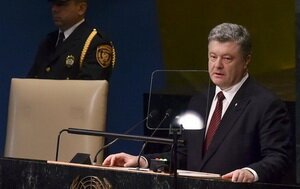 The world's instability. Never since the end of the Cold War the international norms and principles have been neglected on such a scale and with such brutality. The UN Charter had never been put into question before. Never until now its principal offender had been the country-member of the UN Security Council. Global instability is the greatest threat faced now by humanity. On how we'll manage to overcome it, depends the future of our children.
The world's instability. Never since the end of the Cold War the international norms and principles have been neglected on such a scale and with such brutality. The UN Charter had never been put into question before. Never until now its principal offender had been the country-member of the UN Security Council. Global instability is the greatest threat faced now by humanity. On how we'll manage to overcome it, depends the future of our children.
To restrict the right to “veto”. Today, more than ever, there is a need for the UN Security Council reform. Because today, the Russian Federation, as a permanent member of the UN Security Council, has become the main violator of the UN Charter, the initiator and active participant of the conflict and its arbitrator, it is necessary to restrict the right to “veto” in decision-making on conflict prevention and resolution.
Counteracting “hybrid wars”. The UN should respond effectively to acts of aggression in the world and bring the perpetrators to legal liability. “Hybrid wars” are another type of threat to international peace and security, which calls for the international community's urgent actions. The UN Security Council should take the matter under control. Ukraine is ready to initiate a discussion about what the UN Security Council should do in countering the threat of a “hybrid war”.
To stop the nuclear arms race. Ukraine voluntarily gave up the third-largest nuclear arsenal in the world in exchange for guarantees of its sovereignty and territorial integrity under the Budapest Memorandum of 1994, but, unfortunately, all these guarantees have remained on paper. The future of the nuclear non-proliferation regime is causing increasing concern. The international community must not allow the world to get plunged into a new nuclear arms race. Ukraine, as a responsible international actor, has always been and remains committed to the cause of nuclear non-proliferation and disarmament.
Struggle against terrorism. The tentacles of terrorism are wrapping more countries and continents. The threat of international terrorism could be overcome only by joint efforts. Ukraine welcomes the United Kingdom's initiative to convene a special meeting of the UN Security Council on the issue of terrorist threats to aviation security. Ukraine proposes to overcome Russia's “veto” and to ensure proper implementation of the UN Security Council Resolution № 2166 on the establishment of an international tribunal in order to bring to court the terrorists two years ago shot down Malaysian Airlines MH17 over the Donbas.
The state terrorism in Russia. The two and a half years of the conflict in the Donbas have given a significant amount of irrefutable evidence of the direct involvement of Russia, its agencies and officials in financing, supporting and coordinating the activities of terrorist groups, which have committed numerous crimes against the Ukrainian people. The total number of victims of the war imposed on us in the heart of Europe has reached a figure of 10 thousand — 2.5 thousand military and 7.5 thousand civilians. It is necessary to consider the mechanisms for formal recording of some states' aggression against other states, and to provide a clear responsibility in accordance with the principles of the UN Charter. Ukraine remains committed to a political and diplomatic settlement of the situation in the Donbas.
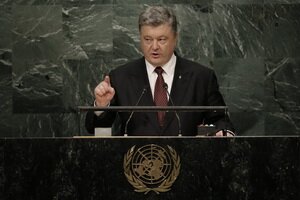 The Kremlin's repressive policy in the Crimea. The occupying Russian authorities continue their repressive policy in the Crimea. Ukraine calls for international human rights organizations' unimpeded access to the Crimea and to the Donbas. Ukraine is ready to submit to the UN General Assembly an appropriate draft resolution on the situation of human rights violations in the occupied territory of the Crimea and Sevastopol. Ukraine calls upon the international community not to recognize the legitimacy of the Russian elections, which were held on the 18th of September 2016 in the occupied Crimea. Russia's intentions to deploy tactic nuclear weapons and means of delivery in the occupied Peninsula actually destroys the global system of non-proliferation of weapons of mass destruction and crudely violates Ukraine's non-nuclear status.
The Kremlin's repressive policy in the Crimea. The occupying Russian authorities continue their repressive policy in the Crimea. Ukraine calls for international human rights organizations' unimpeded access to the Crimea and to the Donbas. Ukraine is ready to submit to the UN General Assembly an appropriate draft resolution on the situation of human rights violations in the occupied territory of the Crimea and Sevastopol. Ukraine calls upon the international community not to recognize the legitimacy of the Russian elections, which were held on the 18th of September 2016 in the occupied Crimea. Russia's intentions to deploy tactic nuclear weapons and means of delivery in the occupied Peninsula actually destroys the global system of non-proliferation of weapons of mass destruction and crudely violates Ukraine's non-nuclear status.
The situation in Syria. Today, the whole democratic world is deeply concerned about the human rights violations and the suffering of the civilian population of Syria. Full implementation of the Geneva Communiqué of 2012 and the UN Security Council Resolution № 2254 is vital to the settlement of a long and bloody conflict in Syria. The primary goals are to improve the humanitarian situation, the international humanitarian organizations' access to Aleppo and other cities, requiring immediate assistance.
The sustainable development goals. Ukraine is fully committed to the implementation of the Sustainable Development Goals adopted by the General Assembly of the UN last year. Ukraine has made its contribution to the achievement of a consensus on a comprehensive agreement on climate change. In a short time in Ukraine, all the ratification procedures for the Treaty of Paris have been completed. Ukraine has finished the implementation of the Plan of Action for Chernobyl and the Decade of recovery and sustainable development of the regions affected by the Chernobyl disaster. We need to continue international efforts to overcome the consequences of the disaster at the Chernobyl Nuclear Power Plant, as well as to complete the respective projects.
The problem of migration. Today, in the world there are about 65 million internally displaced people, including more than 21 million refugees, 3 million asylum-seekers and more than 40 million internally displaced persons. Among the representatives of the latter category there are about 1.8 million inhabitants of the occupied and ravaged by Russia Donbas. The primary duty of the Ukrainian government is to save lives and to protect those who are in need. The General Assembly has just adopted the New York Declaration — the first step towards solving the problem of migration.
About the new Secretary-General of the United Nations. By the end of the year we have to elect a new Secretary-General. The main criteria for a candidate for this important position, apart from high professional qualities, should be: uncompromising position on the issue of compliance with the provisions of the UN Charter and readiness in case of a threat to peace and security to decisively use of all tools available, in particular, of those provided for in Article 99 of the UN Charter.
The President of Ukraine's Bilateral Meetings
The first among the leaders of the states with whom the President of Ukraine met in the sidelines of the 71st session of the UN General Assembly, was the Emir of Qatar Sheikh Tamim bin Hamad Al Thani. The sides discussed prospects of enhancing bilateral trade and economic cooperation, in particular the possibility of Qatari liquefied gas deliveries to Ukraine.
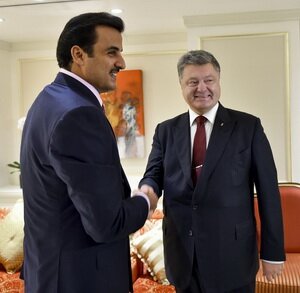 Special attention was paid to attracting Ukrainian companies to large-scale infrastructure projects that are being implemented by the Government of Qatar. The President of Ukraine stressed the interest in Qatari investors' participation in privatization of state enterprises in Ukraine. During the meeting they also discussed the issue of promoting protection of the fundamental rights of Crimean Tatars living in the temporarily occupied territory of the Crimea and in Sevastopol. The Emir of Qatar pointed out the support for Ukraine's territorial integrity and said that his country is against any aggression against a sovereign state. P. Poroshenko invited the Emir of Qatar to visit Kyiv.
Special attention was paid to attracting Ukrainian companies to large-scale infrastructure projects that are being implemented by the Government of Qatar. The President of Ukraine stressed the interest in Qatari investors' participation in privatization of state enterprises in Ukraine. During the meeting they also discussed the issue of promoting protection of the fundamental rights of Crimean Tatars living in the temporarily occupied territory of the Crimea and in Sevastopol. The Emir of Qatar pointed out the support for Ukraine's territorial integrity and said that his country is against any aggression against a sovereign state. P. Poroshenko invited the Emir of Qatar to visit Kyiv.
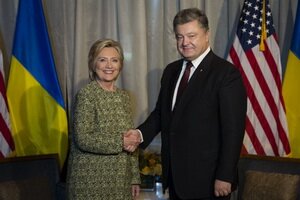 On the morning of September 20, during his meeting with US presidential candidate Hillary Clinton, the President of Ukraine informed his interlocutor about the situation in the Donbas, pointing out that “today Ukraine is struggling for freedom and democratic values that unite the entire civilized world”. The interlocutors agreed that in counteracting the Russian aggression, important are strengthening the transatlantic unity and solidarity with Ukraine and effectiveness of sanctions policy against Russia. P. Poroshenko expressed to Hillary Clinton his gratitude for the support of the sovereignty and territorial integrity of Ukraine. H. Clinton pointed out that in recent years Ukraine has made important progress in implementing reforms and expressed her support for those continued steps.
On the morning of September 20, during his meeting with US presidential candidate Hillary Clinton, the President of Ukraine informed his interlocutor about the situation in the Donbas, pointing out that “today Ukraine is struggling for freedom and democratic values that unite the entire civilized world”. The interlocutors agreed that in counteracting the Russian aggression, important are strengthening the transatlantic unity and solidarity with Ukraine and effectiveness of sanctions policy against Russia. P. Poroshenko expressed to Hillary Clinton his gratitude for the support of the sovereignty and territorial integrity of Ukraine. H. Clinton pointed out that in recent years Ukraine has made important progress in implementing reforms and expressed her support for those continued steps.
Separately, P. Poroshenko met with former US President Bill Clinton. According to the President of Ukraine's Press-Secretary S. Tsegolko, the meeting was “very warm and friendly”.
President P. Poroshenko had the intention to meet with both US presidential candidates during his stay in New York. However, D. Trump's representatives had never responded to the invitation. As it has become known, D. Trump had gone to North Carolina as part of his election campaign. Chairman of the RF State Duma Committee for International Affairs A. Pushkov on his Twitter page did not fail to write maliciously about the event: “Trump just does not see any sense in communicating with Poroshenko. He understands very well which capital cities decide on the fate of the world, and which just hinder...” While talking to reporters in New York, P. Poroshenko explained that the meeting with presidential candidate D. Trump did not take place because of busy schedules on both sides, adding that there were no other reasons in this situation.
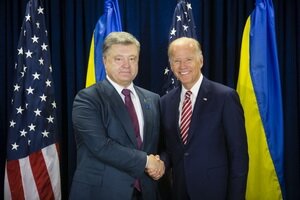 During P. Poroshenko's meeting with US Vice President Joe Biden, they discussed the situation in the Donbas and the process of implementation of the Minsk Agreements. P. Poroshenko thanked the US Administration for tougher sanctions against Russia. Vice President Joe Biden informed P. Poroshenko about the US government's readiness to give Ukraine 1 billion US dollars loan guarantees. Biden also warned P. Poroshenko that Ukraine should more actively pursue economic and political reforms, otherwise there is a high risk of lifting the sanctions from Russia.
During P. Poroshenko's meeting with US Vice President Joe Biden, they discussed the situation in the Donbas and the process of implementation of the Minsk Agreements. P. Poroshenko thanked the US Administration for tougher sanctions against Russia. Vice President Joe Biden informed P. Poroshenko about the US government's readiness to give Ukraine 1 billion US dollars loan guarantees. Biden also warned P. Poroshenko that Ukraine should more actively pursue economic and political reforms, otherwise there is a high risk of lifting the sanctions from Russia.
Speaking recently at the Council for Foreign Relations in New York, Joe Biden said that “at least five EU countries now want to withdraw from sanctions against Moscow”. J. Biden also said that two or three times every week he has been on the phone talking with the Ukrainian leadership, and has consistently emphasized the need for reform in Ukraine, and “talks” the leaders of Germany, France and Italy into not lifting sanctions against Russia.
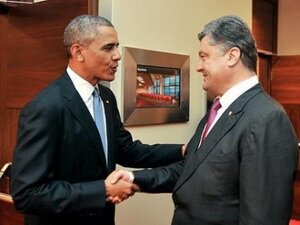 On the night of September 22, P. Poroshenko had a long meeting with US President B. Obama, during which they discussed the process of implementation of the Minsk Agreements, the “road map” of implementation and security priorities of these Agreements, the implementation of the political components of the solution to the conflict in the East of Ukraine. The two sides also discussed topical issues of the bilateral relations and implementation of reforms in Ukraine.
On the night of September 22, P. Poroshenko had a long meeting with US President B. Obama, during which they discussed the process of implementation of the Minsk Agreements, the “road map” of implementation and security priorities of these Agreements, the implementation of the political components of the solution to the conflict in the East of Ukraine. The two sides also discussed topical issues of the bilateral relations and implementation of reforms in Ukraine.
At the session of the General Assembly, B. Obama for the eighth and last time spoke as the Head of the White House. Traditionally the general political debate at each session of the UN General Assembly was opened by the US Presidents. This is due not only to the fact that the USA is a great power, but above all because the UN is headquartered in the United States and this country makes the largest financial contribution to the budget (2.7 billion US dollars in 2015) of this global international Organization — 22 % (for comparison, Russia — only 2 %).
In my opinion, B. Obama's speech was very informative and rich in deep philosophical generalizations, but we'll confine ourselves to what the US President said about the Ukrainian-Russian confrontation. In particular, he stated that Russia is “trying to recover through force its lost glory in a world that left the age of empire behind”. According to B. Obama, “Russia's continuing meddling in the affairs of its neighbors may be popular for some time in the country and keep the fire of nationalism, but over time it will only weaken its positions and make its borders less secure”. According to the President of the United States, “The Ukrainian people took to the streets not because of some kind of conspiracy, imposed from abroad. Ukrainians took to the streets because they had corrupt leaders, and there was no other way of action. They demand changes because they have seen that the life of people in the Baltic countries and Poland has improved”.
Note:
During the President of Ukraine's visit to New York, the US House of Representatives unanimously approved a bill H.R. 5094 “Support for Stability and Democracy in Ukraine”. The document fixes the preservation of US sanctions against Russia until the latter's complete and proven fulfillment of the Minsk Agreements. The bill includes a ban on the USA's recognition of the Russian Federation's annexation of the Crimea. The list of the provided for by the draft law tools for supporting Ukraine includes lethal defencive weapons systems. The bill contains provisions aimed at strengthening counteracting the Russian informational propaganda and assistance in attracting foreign investments into Ukraine's economy. Co-authors of the document are about 40 Congressmen from the Democratic and Republican parties. Before the bill is signed by the President of the United States, it must be approved by the Senate.
During P. Poroshenko's meeting with Prime Minister of Japan Shinzo Abe, they discussed the implementation of agreements reached during the Ukrainian President's official visit to Japan in April this year. In particular, P. Poroshenko and Shinzo Abe paid attention to preparations for the Year of Japan in Ukraine in 2017. P. Poroshenko and S. Abe also discussed global security issues, in particular — they condemned the North Korea's nuclear test.
During P. Poroshenko's meeting with the Turkish Republic's President Recep Tayyip Erdogan, they discussed the state of implementation of agreements reached during the fifth meeting of the High-Level Strategic Council. The two sides agreed to hold in the nearest future a meeting of the Ukrainian-Turkish working group on energy issues. The Ukrainian President invited Turkish companies to take part in the privatization of Ukrainian enterprises. R. Erdogan said that Turkey would continue supporting Ukraine in the issues of restoration of the sovereignty and territorial integrity of our country, non-recognition of the annexation of the Crimea and condemnation of violations of the rights of the Crimean Tatars, despite the recent resumption of dialogue between Ankara and Moscow.
Note:
These words of the President of Turkey caused Moscow's discontent. According to Deputy Chairman of the RF State Duma Committee for Defence and Security F. Klintsevich, “Russia has received yet another confirmation that the “friendship” with Turkey has certain boundaries and is quite conditional... It seems that the Turkish President, figuratively speaking, is trying to perform several parties on one piano”. Klintsevich expressed confidence that the Russian Foreign Ministry has already drawn attention to R. Erdogan's statements, “having drawn the right conclusions”...
The President of Ukraine and Prime Minister of New Zealand John Key held the first in the history of bilateral relations talks at the highest level. The Ukrainian President drew the attention of the head of the New Zealand Government to the necessity of expanding the legal base of the relations. P. Poroshenko thanked John Kay for New Zealand's firm position in support of Ukraine's sovereignty and territorial integrity and for condemning Russia's aggression against our country. John Kay invited the President of Ukraine to visit New Zealand at a convenient time.
On the sidelines of the 71st session of the UN General Assembly there took place President of Ukraine P. Poroshenko's meeting with President of Argentina Mauricio Macri. The Presidents of the two countries reaffirmed their common interest in developing cooperation in the energy sphere, rocket and space and aviation industry as well as in agriculture. P. Poroshenko said that Argentina was the only Latin American country which in February 1921 recognized the Ukrainian People's Republic and established diplomatic relations with it, as well as the first Latin American country to recognize the independence of Ukraine on December 5, 1991. For its part, Mauricio Macri praised the large Ukrainian community's contribution into the development of the Argentine state.
During the meeting with President of Croatia, Kolinda Grabar-Kitarovic, the Head of the Ukrainian State expressed hope that the new Croatian government would continue supporting the territorial integrity and sovereignty of Ukraine. The Croatian President emphasized the long-standing friendly relations between the two countries and pointed out that Croatia is ready to share with Ukraine its experience of the post-war recovery and reintegration of the temporarily occupied territories. The President of Ukraine expressed interest in joining the Adriatic-Baltic-Black Sea initiative.
P. Poroshenko had a meeting with President of Latvia Raimonds Vējonis during which he thanked the Latvian government for its consistent support of the policy of sanctions against Russia due to the latter's aggression against Ukraine. P. Poroshenko addressed the President of Latvia with a request to assist in the Ukrainian law enforcement authorities' investigations in cases against members of the former Ukrainian government and in returning to Ukraine the money confiscated by the Latvian government.
During P. Poroshenko's meeting with Australian Prime Minister Malcolm Turnbull, theystressed the ongoing development of the Ukrainian-Australian cooperation in accordance with the agreements reached on the results of the Ukrainian President's visit to Australia in December, 2014. The President of Ukraine and the Prime Minister of Australia coordinated joint actions to bring to justice those responsible for the destruction of the Flight MH17. P. Poroshenko expressed gratitude to Australia for its clear and consistent position in support of Ukraine's sovereignty and territorial integrity.
Hungarian President Janos Ader during his meeting with P. Poroshenko confirmed the continued support for the sovereignty and territorial integrity of Ukraine, as well as the continuation of the policy of sanctions against Russia. The President of Ukraine thanked Hungary for its financial and humanitarian assistance to Ukraine, as well as the treatment of Ukrainian soldiers. The two sides agreed to boost economic cooperation, particularly in the spheres of energy engineering, agriculture and infrastructure projects.
The President of Ukraine had a meeting with President of the Slovak Republic Andrei Kiska, during which he criticized the recent statement by the Prime Minister of Slovakia Robert Fico, in which he stated that “Ukraine is doing less than Russia to fulfill its obligations under the Minsk Agreements”. (R. Fico also considers sanctions against Russia to be ineffective, because they are supposedly “harmful” for the European Union and for the economic interests of Slovakia, in particular. At the same time, he noted that respects the solidarity and unity of the EU on this issue). In respond A. Kiska assured of firmness of Slovakia's position regarding the respect for the sovereignty and territorial integrity of Ukraine, and also stressed the continued support for the policy of sanctions against Russia.
The President of Ukraine also had separate meetings with NATO Secretary-General Jens Stoltenberg, the United States Secretary of State John Kerry and Director of the International Monetary Fund Christine Lagarde.
Sergey Lavrov's Speech
During his 17 years in power, Russian President V. Putin has attended the session of the UN General Assembly, only four times: in 2000, 2003, 2005 and 2015. It is known that V. Putin did not wish to take part in the 71st session of the UN General Assembly. Apparently, Putin had nothing to say to the world. And he obviously did not want to hear another batch of criticism before the whole world from the mouths of B. Obama and P. Poroshenko. The Russian delegation at the session of the General Assembly was headed by Foreign Minister of the Russian Federation Sergey Lavrov, who spoke in the general debate on 23 September.
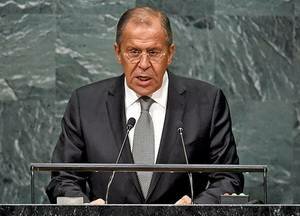 From the lips of the official representative of the aggressor country, the words of condemnation sounded odd and hypoctitical “...some countries' attempts to interfere with other states' internal affairs, to impose models of development to countries and peoples”. S. Lavrov also pointed out that “among the political elites of some Western countries, deeply rooted are the ideas of mentoring, excellence, exclusivity, realization of their own interests by any means at the expense of forming a fair and equitable cooperation”. According to S. Lavrov, “...a victim of lovers of zero sum games has become close to us Ukraine (God preserve us from this closeness!), whose development was undermined by the anti-constitutional coup, and now is being destroyed as a result of Kyiv's failure to implement the Minsk Agreements of February 12, 2015. The futility of counting on using the Ukrainian crisis to achieve their selfish geopolitical goals is already obvious to all. We expect that the life itself will force to achieve the implementation of all the measures, signed by the Ukrainian leadership in Minsk”...
From the lips of the official representative of the aggressor country, the words of condemnation sounded odd and hypoctitical “...some countries' attempts to interfere with other states' internal affairs, to impose models of development to countries and peoples”. S. Lavrov also pointed out that “among the political elites of some Western countries, deeply rooted are the ideas of mentoring, excellence, exclusivity, realization of their own interests by any means at the expense of forming a fair and equitable cooperation”. According to S. Lavrov, “...a victim of lovers of zero sum games has become close to us Ukraine (God preserve us from this closeness!), whose development was undermined by the anti-constitutional coup, and now is being destroyed as a result of Kyiv's failure to implement the Minsk Agreements of February 12, 2015. The futility of counting on using the Ukrainian crisis to achieve their selfish geopolitical goals is already obvious to all. We expect that the life itself will force to achieve the implementation of all the measures, signed by the Ukrainian leadership in Minsk”...
In my opinion, a greater blasphemy and double-dealing can hardly be imagined. But then, what wonder? Such statements fall well within the format of Russia's current “hybrid” foreign policy, accusing others of crimes that it commits itself. This was clearly said in the August 22 election debates on “Moscow 24” TV channel by a representative of the Parnas Party Professor Andrei Zubov: “The annexation of the Crimea is a deep negative milestone in the history of Russia. By the annexation of the Crimea Russia has violated all international treaties. For the first time since 1945 there was the annexation of the territory of another country that was condemned by the international community... What was done in the Crimea and is being done in the Donbas today — is a huge damage to Russia. We have abandoned the principle of inviolability of borders, fixed in the Helsinki agreement”.
The same day, on the “Russia-1” TV channel, A. Zubov stated that “...Russia should get rid of Putin since he has become its sole ruler. In violation of the Constitution, he has created an absolute monarchy in Russia. By his will we start wars, get involved in military adventures thousands of kilometers away from our country. Russian media praise Putin and thereby create his cult of personality. When Putin gives up power, Russian citizens will restore their right to have control of all the bodies of power”…
* * *
Ukraine is able to withstand Russian aggression and to liberate the occupied territories only with the support of the international community, therefore, the main purpose of the participation of the President of Ukraine in the 71st session of the UN General Assembly was to ensure continued full support of Ukraine on the part of both the US Administration and the governments of other leading countries of the world. In our opinion, the President largely succeeded in this, despite a series of unfortunate circumstances: the “fatigue” of the leaders of leading countries of the West from the “Ukrainian crisis”; incapacity of the Minsk Agreements; aggravation of the political situation in the EU because of the problems with the massive stream of migrants from the Middle East; Brexit and the forthcoming presidential and parliamentary elections in the United States, France and Germany.
During his participation in the 71st session of the UN General Assembly, the President of Ukraine had to constantly respond to the speeches of partners and opponents, to change tactics on the way to the strategic goal — to strengthen, or at least not to weaken, the Western countries' support for Ukraine on its way to the liberation of the occupied by Russia Ukrainian territories. Speaking about the Russian aggression against Ukraine, P. Poroshenko every time in his public statements at the highest level tried, quite successfully, to use new arguments, facts and evidence to persuade Western partners of the need for joint opposition to Russian expansion. To a large extent the President did manage to do it in the course of public speeches and in holding bilateral meetings with high-level leaders of more than 10 world countries on the sidelines of the 71st session of the UN General Assembly.
The Ukrainian delegation returned from New York to Kyiv with weighty diplomatic achievements, which will undoubtedly contribute to further struggle for the defence of national interests of Ukraine, its sovereignty and territorial integrity.

